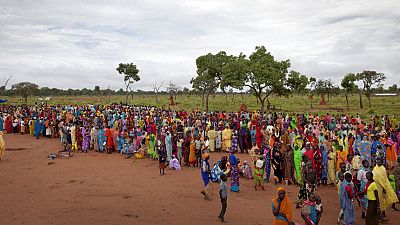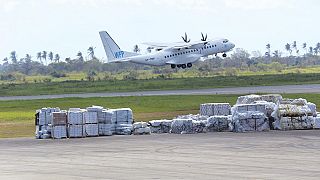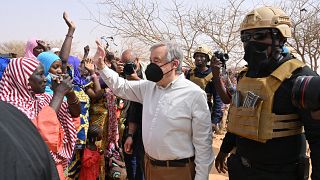African migrants
The head of the U.N. refugee agency says "Europe should be much more worried" that more people from Africa's Sahel region could seek to move north to escape violence, climate crises and the impact of growing food shortages.
Filippo Grandi, the U.N. High Commissioner for Refugees, called for more efforts to build peace in the world as conflicts and crises like those in Ukraine, Venezuela, Myanmar, Syria and beyond have driven over 100 million people to leave their homes — both within their own countries and abroad.
UNHCR, the U.N.'s refugee agency, on Thursday, issued its latest "Global Trends" report, which found over 89 million people had been displaced by conflict, climate change, violence and human rights abuses by 2021.
The figure has since swelled after at least 12 million people fled their homes in Ukraine following Russia's Feb. 24 invasion.
This year, the world is also facing growing food insecurity — Ukraine is a key European bread basket and the war has greatly hurt grain exports
The African Union, whose continent relies on imports of wheat and other food from Ukraine, has appealed for help to access grain that is blocked in Ukrainian silos and unable to leave Ukrainian ports amid a Russian naval blockade in the Black Sea.
UNHCR said 2021 marked the 15th straight year of the annual increase in the number of people displaced within their own countries – to more than 53 million.
Among the reasons: Rising violence in places like Myanmar, the war in Ethiopia's Tigray region and extremist insurgencies in the Sahel, particularly in Burkina Faso and Mali.
Grandi said the Sahel has already faced years of droughts and floods; inequality in wealth, education and access to healthcare; and poor governance. Growing food insecurity and conflict have added to the pressures.













Go to video
Nelson Mandela International Day 2025: The power to end poverty is in our hands
00:11
US, European allies agree August deadline for Iran nuclear deal
Go to video
UN Special Rapporteur calls for concrete action on 'genocidal' Gaza occupation
01:07
Only 35% of sustainable development goals on track to meet target, UN says
Go to video
Almost 300 killed in wave of violence in Sudan’s North Kordofan
02:03
Muhammadu Buhari's legacy: higlight of his presidential tenure